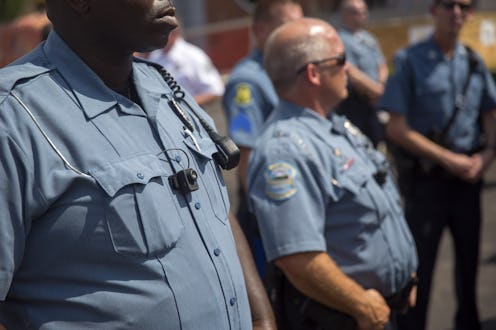News
Could Body Cameras Prevent Another Ferguson?
Following Tuesday night's grand jury decision not to indict Darren Wilson, Michael Brown’s family released a statement asking that police officers across America wear body cameras. Brown's attorney, Benjamin Crump, also called for “The Mike Brown Law,” which would require "every police officer in every American city has a video body camera,” said Crump. Proponents of the law, which boasts a petition with more than 100,000 signatures, argues that body cameras will cut back on violence and make police more accountable for their actions.
In a statement, Brown's parents said:
We are profoundly disappointed that the killer of our child will not face the consequence of his actions. While we understand that many others share our pain, we ask that you channel your frustration in ways that will make a positive change. We need to work together to fix the system that allowed this to happen. Join us in our campaign to ensure that every police officer working the streets in this country wears a body camera. We respectfully ask that you please keep your protests peaceful. Answering violence with violence is not the appropriate reaction Let's not just make noise, let's make a difference.
Some small American towns, roughly the size of Ferguson, have already tested out body cameras for their law enforcement officers. For example, when officers in Rialto, California, started wearing body cameras in February 2012, public complaints against the police dropped by 88 percent, and their use of force dropped by 60 percent.
The body cameras, which can be worn on an officer's shirt, belt, or glasses would provide useful evidence of interactions between police and civilians. Each of these cameras costs between $300 and $400, according to the Wall Street Journal. The videos would later be used in court cases, in new officer training, or available to for viewing like any other public record. Still, critics of the body cameras worry that the videos may impinge on citizens’ privacy.
The cost and the privacy issues are part of the reason larger cities are slow to start using the cameras. Just 60 of the New York Police Department's 34,500 officers were outfitted with cameras in a pilot program for the force last month. The program was somewhat successful in restoring citizens' trust in the police, New York Police Commissioner Bill Bratton said in a press conference. It will be expanded next month, with more cameras for more officers.
Former Mayor Michael Bloomberg insisted to Marc Santora of the New York Times that the body camera program would be “a nightmare." He told the New York Times,
We can’t have your cameraman follow you around and film things without people questioning whether they deliberately chose an angle, whether they got the whole picture in.
The Ferguson decision, which hinged on Wilson’s word versus those of other witnesses, could arguably have been made with more ease, one way or another, if the jury could have accessed footage of the shooting.
And, of course, there are concerns about cost. Los Angeles Police Commissioner Steve Soboroff is relying on private donations to outfit officers of the LAPD with body cameras.
The proposal from Brown's family and attorney can only become a nationwide law if a Congressperson or Senator sponsors the bill and submits it to the House and the Senate. However, many states and cities may choose to implement body camera laws on a much smaller, but faster, scale.
While the rush for body cameras comes too late to help Michael Brown and his family, these demands give hope to many citizens who want cops to be held more accountable in the future.
Images: Getty Images (3)
